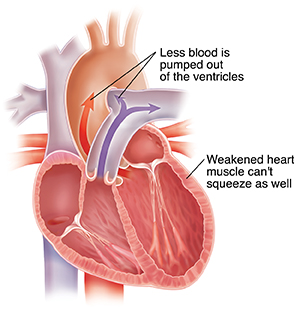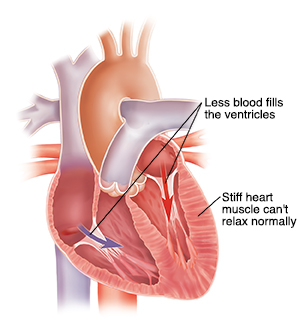What Is Heart Failure?
The heart is a muscle that pumps oxygen-rich blood to all parts of the body. When you have heart failure, the heart is not able to pump as well as it should. Blood and fluid may back up into the lungs, and some parts of the body don’t get enough oxygen-rich blood to work normally.
When you have heart failure
With heart failure, not enough oxygen-rich blood leaves the heart with each beat. There are 2 types of heart failure. Both affect how well the left ventricles can pump blood. You may have one or both types.
|

|

|
|
Systolic heart failure. The heart muscle becomes weak and enlarged. It can’t pump enough oxygen-rich blood forward to the rest of the body when the ventricles contract. The measurement of how much blood your heart pumps out with each beat is called ejection fraction. In systolic heart failure, the ejection fraction is lower than normal. This can cause blood to back up into the lungs and cause shortness of breath and eventually ankle swelling (edema). This is also known as heart failure with reduced ejection fraction (HFrEF), heart failure with mildly reduced ejection fraction (HFmrEF), or heart failure with improved ejection fraction (HFimpEF).
|
Diastolic heart failure. The heart muscle becomes stiff. It doesn’t relax normally between contractions. This keeps the ventricles from filling with blood as they should. Ejection fraction is often in the normal range. This can still lead to the backup of blood into the body and affect the organs such as the liver. This is also called heart failure with preserved ejection fraction, or HFpEF.
|
Recognizing heart failure symptoms
When you have heart failure, you need to pay close attention to your body and how you feel, every single day. That way, if a problem occurs, you can get help before it becomes too severe. You'll need to watch for changes in your symptoms. As long as symptoms stay about the same from one day to the next, your heart failure is stable. But if symptoms start to get worse, it's time to take action.
Signs and symptoms of worsening heart failure include:
-
Rapid weight gain from fluid buildup
-
Shortness of breath, especially when lying down flat
-
Fast heart rate
-
Cough that won't go away
-
Swelling, especially in the feet (edema), legs, or abdomen
-
Tiredness (fatigue)
-
Nausea or loss of appetite
How heart failure affects your body
When the heart doesn't pump enough blood, hormones are sent to increase the amount of work the heart does. Some hormones make the heart grow larger. Others tell the heart to pump faster. As a result, the heart may pump more blood at first, but it can't keep up with the ongoing demands. So, the heart muscle becomes even weaker. Over time, even less blood is pumped through the heart. This leads to problems throughout the body as organs start to feel the effects of a long-term lack of oxygen. If not treated, over time this can cause problems with your lungs, liver, and kidneys. Long-term (chronic) leg swelling (edema) can also cause skin changes and breakdown. A weak heart itself can eventually cause a severe decline in health and possible death if left untreated.
What is ejection fraction?
Left ventricular ejection fraction (LVEF) is a measurement of how well your heart pumps blood. It measures how much blood in the heart's ventricle is pumped out (ejected) with each heartbeat. This is measured to help diagnose heart failure. A healthy heart pumps at least half of the blood from the ventricles with each beat. This means a normal ejection fraction is around 50% to 70%. There are 4 groupings of HF measured through LVEF.
-
HFrEF. LVEF is 40% or less. (systolic HF)
-
HFmrEF. LVEF is 41% to 49% with higher filling pressure in the left ventricle. (systolic HF)
-
HFimpEF. A past LVEF less than 40% and a follow-up amount of LVEF greater than 40%. (systolic HF)
-
HFpEF. LVEF is 50% or more with higher filling pressure in the left ventricle. (diastolic HF)
Your healthcare provider will calculate ejection fraction from an echocardiogram or other tests. Your healthcare provider can talk with you about treatment options and how to improve your EF.
My ejection fraction
Date: ______________________
Ejection fraction: _____________
Test used: __________________
How daily issues affect your health
Many things in your daily life impact your health. This can include transportation, money problems, housing, access to food, and child care. If you can’t get to medical appointments, you may not receive the care you need. When money is tight, it may be difficult to pay for medicines. And living far from a grocery store can make it hard to buy healthy food.
If you have concerns in any of these or other areas, talk with your healthcare team. They may know of local resources to assist you. Or they may have a staff person who can help.